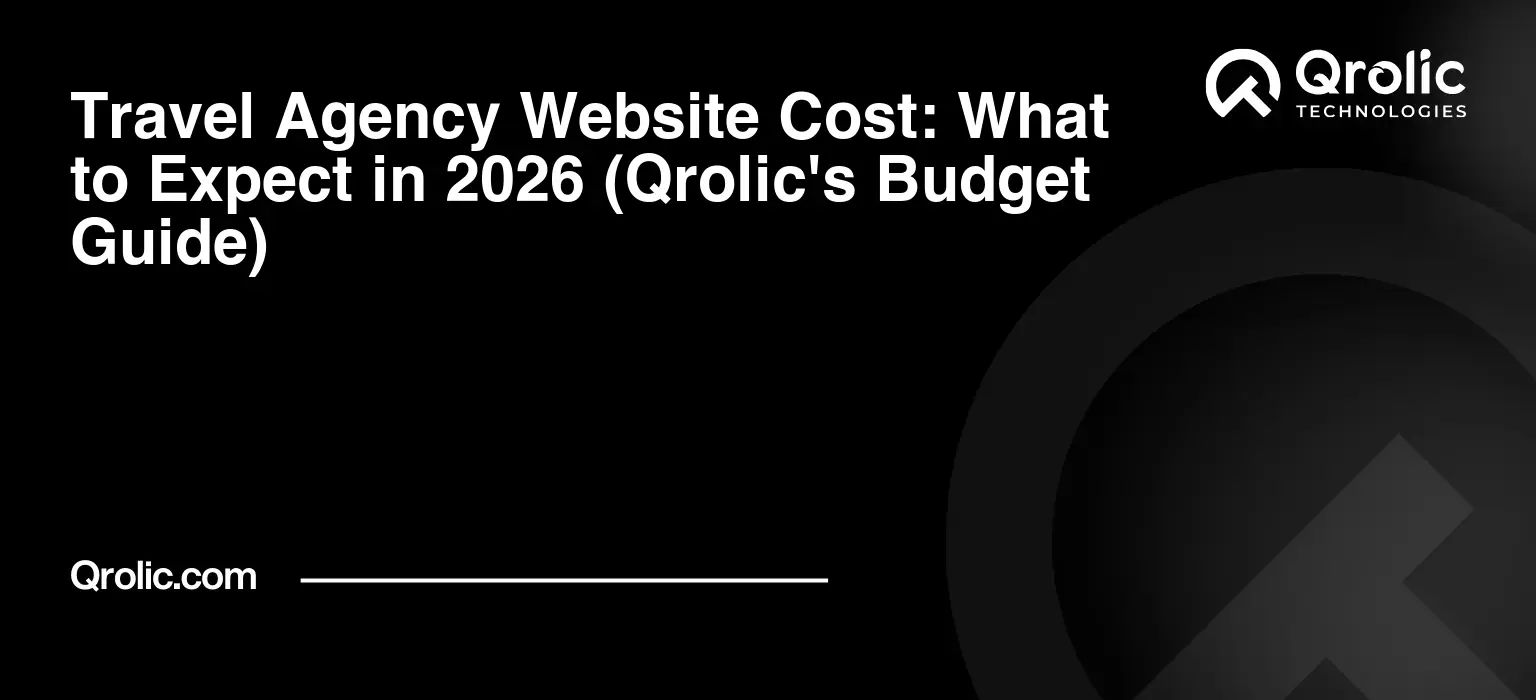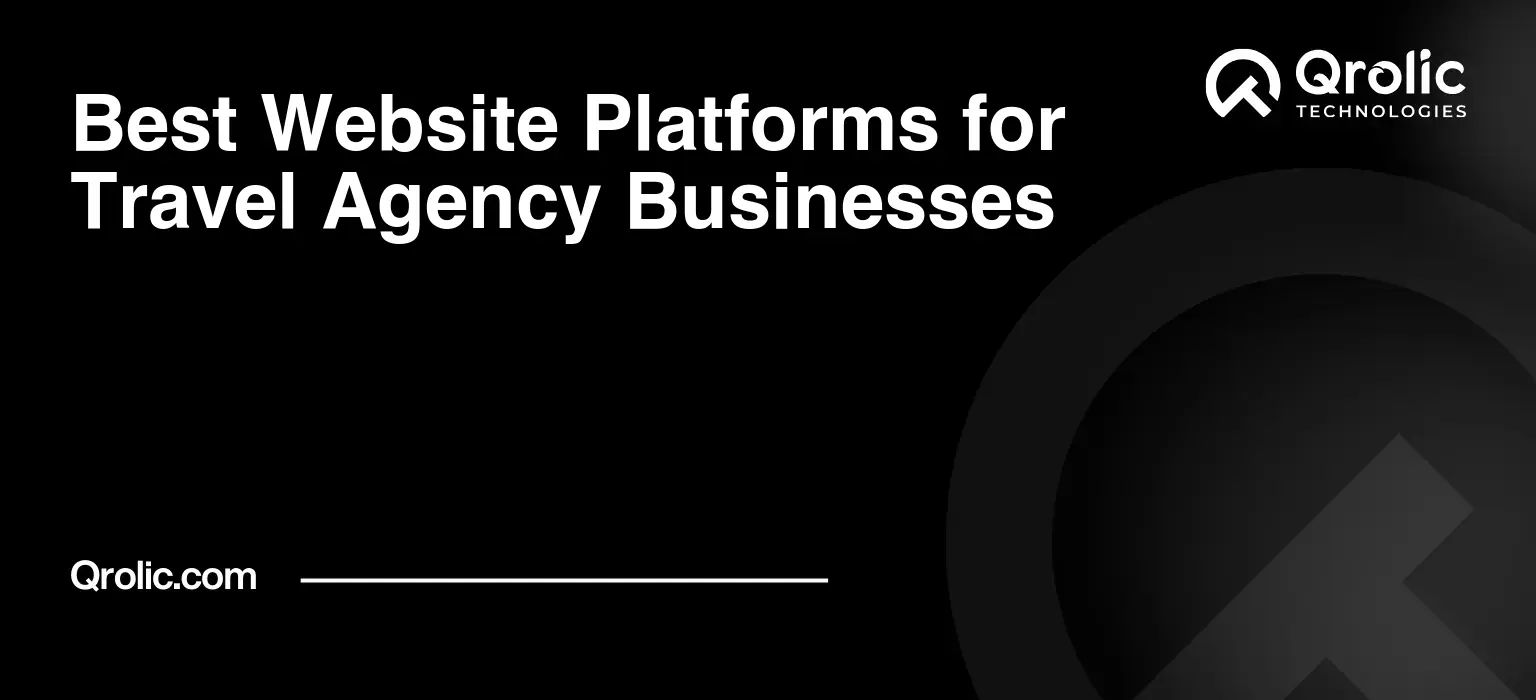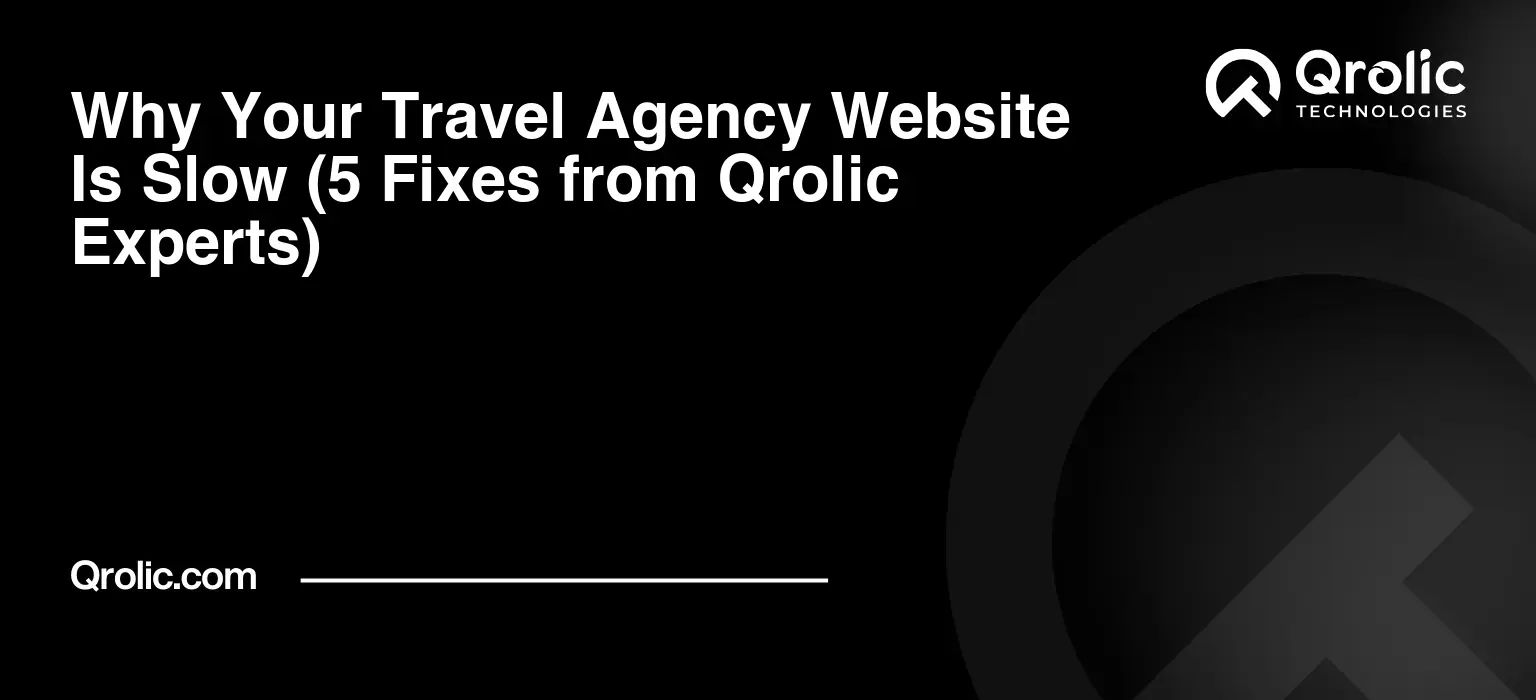The digital landscape has irrevocably changed the travel industry. No longer are brick-and-mortar agencies the sole gateway to adventure. Today, travelers research, compare, and book trips online, often without ever setting foot in a physical office. For travel agencies, this transformation necessitates a robust online presence, and at the heart of that presence lies your website. This comprehensive guide will delve deep into the world of travel agency website development, exploring everything from the foundational elements to advanced strategies for attracting and converting online travelers. Whether you’re a seasoned agency looking to revamp your digital footprint or a budding startup venturing into the online travel market, this guide provides the insights and actionable advice you need to thrive.
Quick Summary:
- A strong website is essential for travel agency success.
- Include user-friendly design, stunning visuals, and online booking.
- Optimize for mobile, search engines, and integrate smart tech.
Table of Contents
- Why a Powerful Website is Crucial for Travel Agencies
- Key Elements of an Effective Travel Agency Website
- 1. User-Friendly Navigation: The Foundation of a Positive Experience
- 2. High-Quality Visuals: Inspiring Wanderlust
- 3. Compelling Content: Informing and Engaging Your Audience
- 4. Booking Functionality: Streamlining the Reservation Process
- 5. Mobile Optimization: Reaching Travelers on the Go
- 6. SEO Optimization: Driving Organic Traffic
- 7. Security: Protecting Customer Data and Building Trust
- 8. Analytics and Tracking: Measuring Performance and Making Improvements
- 9. Social Media Integration: Expanding Your Reach
- 10. Customer Support: Providing Assistance and Building Loyalty
- Advanced Strategies for Travel Agency Website Development
- 1. Personalization: Tailoring the Experience
- 2. Chatbots: Automating Customer Service
- 3. Virtual Reality (VR) and Augmented Reality (AR): Immersive Experiences
- 4. Artificial Intelligence (AI): Smarter Recommendations and Automation
- 5. Multilingual Support: Reaching a Global Audience
- 6. Loyalty Programs: Rewarding Customer Loyalty
- 7. Dynamic Pricing: Optimizing Revenue
- Steps to Develop a Successful Travel Agency Website
- Step 1: Define Your Goals and Target Audience
- Step 2: Conduct Keyword Research
- Step 3: Choose a Domain Name and Hosting Provider
- Step 4: Select a Website Platform or CMS
- Step 5: Design Your Website
- Step 6: Develop Your Website Content
- Step 7: Implement Booking Functionality (if applicable)
- Step 8: Optimize for Mobile
- Step 9: Implement SEO Best Practices
- Step 10: Test Your Website
- Step 11: Launch Your Website
- Step 12: Track Your Results and Make Improvements
- Benefits of Working with a Professional Web Development Agency
- Qrolic Technologies: Your Partner in Travel Agency Website Development
- Conclusion: Investing in Your Online Future
Why a Powerful Website is Crucial for Travel Agencies
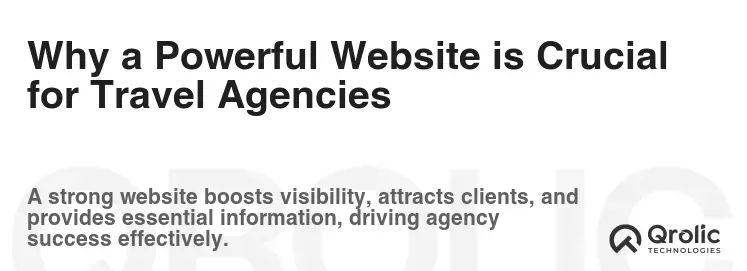
Before diving into the “how,” let’s solidify the “why.” A well-designed and functional website isn’t just a nice-to-have for travel agencies; it’s an absolute necessity for survival and growth. Consider these key reasons:
-
24/7 Availability: Unlike physical offices with limited hours, your website operates around the clock, globally. Potential customers can browse destinations, explore packages, and even book trips at their convenience, regardless of time zone.
-
Expanded Reach: A website transcends geographical limitations. You can attract customers from anywhere in the world, broadening your potential market far beyond your local community.
-
Enhanced Credibility and Trust: A professional-looking website instantly enhances your agency’s credibility. It demonstrates that you’re a legitimate and trustworthy business, crucial for attracting customers who are entrusting you with their travel plans.
-
Cost-Effectiveness: Compared to traditional marketing methods like print advertising or direct mail, a website offers a significantly more cost-effective way to reach a wider audience. Search engine optimization (SEO) can drive organic traffic, reducing your reliance on expensive advertising campaigns.
-
Personalized Customer Experience: A well-designed website allows you to personalize the customer experience. You can tailor content based on user preferences, track browsing behavior, and offer customized recommendations, leading to increased engagement and conversion.
-
Direct Communication Channel: Your website serves as a direct communication channel with your customers. You can provide real-time updates, answer FAQs, and offer personalized support through live chat or email.
-
Competitive Advantage: In today’s digital age, having a superior website is a key differentiator. It allows you to stand out from the competition and attract customers who are looking for a seamless and informative online experience.
-
Data Collection and Analysis: Your website provides valuable data about customer behavior, preferences, and booking patterns. This data can be used to optimize your website, improve your marketing strategies, and enhance your overall business performance.
-
Showcasing Expertise and Authority: Through blog posts, destination guides, and expert travel tips, your website allows you to showcase your expertise and establish yourself as an authority in the travel industry. This builds trust and attracts customers who are seeking reliable information and guidance.
Key Elements of an Effective Travel Agency Website
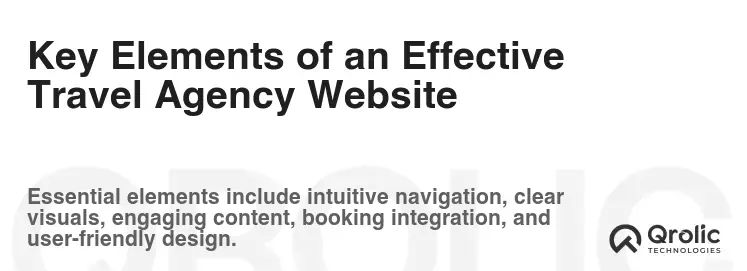
Now that you understand the importance of a strong online presence, let’s explore the essential elements that constitute a successful travel website design.
1. User-Friendly Navigation: The Foundation of a Positive Experience
Navigation is paramount. Visitors should be able to easily find what they’re looking for, whether it’s a specific destination, a particular type of tour, or your contact information.
-
Clear and Concise Menu: Use a clear and concise menu structure with logical categories. Avoid jargon and use descriptive labels that accurately reflect the content of each page.
-
Intuitive Search Functionality: Implement a robust search function that allows users to quickly find specific destinations, activities, or packages based on keywords.
-
Breadcrumb Navigation: Use breadcrumb navigation to help users understand their location within the website and easily navigate back to previous pages.
-
Mobile-First Design: Ensure that your website is fully responsive and optimized for mobile devices. A significant portion of travel bookings are now made on mobile devices, so a seamless mobile experience is crucial.
2. High-Quality Visuals: Inspiring Wanderlust
Travel is inherently visual. Use high-quality photos and videos to showcase destinations, accommodations, and activities.
-
Professional Photography: Invest in professional photography that captures the beauty and essence of your destinations. Avoid using generic stock photos.
-
Compelling Videos: Create engaging videos that showcase travel experiences, highlight key attractions, and provide a glimpse into the local culture.
-
Image Optimization: Optimize images for web use to ensure fast loading times. Large, unoptimized images can significantly slow down your website and negatively impact the user experience.
-
Interactive Galleries and Carousels: Use interactive galleries and carousels to showcase multiple images and videos in an engaging and visually appealing way.
3. Compelling Content: Informing and Engaging Your Audience
Content is king. Provide informative, engaging, and persuasive content that inspires travelers and helps them make informed decisions.
-
Destination Guides: Create comprehensive destination guides that provide detailed information about attractions, activities, accommodations, and local customs.
-
Tour and Package Descriptions: Write clear and concise descriptions of your tours and packages, highlighting the key features and benefits.
-
Blog Posts: Regularly publish informative and engaging blog posts on travel-related topics, such as destination spotlights, travel tips, and packing guides.
-
Customer Testimonials: Showcase positive customer testimonials to build trust and credibility.
-
Call to Action: Use clear and compelling calls to action to encourage visitors to book trips, request quotes, or contact you for more information.
4. Booking Functionality: Streamlining the Reservation Process
If you offer online booking, ensure that the process is seamless and user-friendly.
-
Easy-to-Use Booking Engine: Implement a user-friendly booking engine that allows customers to easily search for and book trips.
-
Secure Payment Gateway: Integrate a secure payment gateway to protect customer financial information.
-
Real-Time Availability: Provide real-time availability updates to ensure that customers are booking trips that are actually available.
-
Flexible Payment Options: Offer a variety of payment options, such as credit cards, debit cards, and PayPal.
-
Automated Confirmation Emails: Send automated confirmation emails to customers after they book a trip.
5. Mobile Optimization: Reaching Travelers on the Go
As mentioned before, a mobile-first approach is crucial.
-
Responsive Design: Ensure that your website adapts seamlessly to different screen sizes and devices.
-
Fast Loading Times: Optimize your website for fast loading times on mobile devices.
-
Touch-Friendly Navigation: Use touch-friendly navigation elements that are easy to use on mobile devices.
-
Mobile-Specific Content: Consider creating mobile-specific content that is tailored to the needs of mobile users.
6. SEO Optimization: Driving Organic Traffic
Search engine optimization (SEO) is essential for driving organic traffic to your website.
-
Keyword Research: Conduct thorough keyword research to identify the keywords that your target audience is using to search for travel-related information. Travel agency website development, tour operator web design, and travel website design are examples of primary keywords. You also need to incorporate secondary and LSI(latent semantic indexing) keywords.
-
On-Page Optimization: Optimize your website’s content, meta descriptions, and title tags with relevant keywords.
-
Off-Page Optimization: Build high-quality backlinks from reputable websites in the travel industry.
-
Local SEO: Optimize your website for local search to attract customers in your local area.
-
Content Marketing: Create high-quality content that attracts and engages your target audience.
7. Security: Protecting Customer Data and Building Trust
Security is paramount. Implement measures to protect customer data and build trust.
-
SSL Certificate: Install an SSL certificate to encrypt data transmitted between your website and users.
-
Secure Hosting: Choose a secure hosting provider that implements robust security measures.
-
Regular Security Audits: Conduct regular security audits to identify and address potential vulnerabilities.
-
Privacy Policy: Clearly communicate your privacy policy to users.
8. Analytics and Tracking: Measuring Performance and Making Improvements
Use analytics and tracking tools to measure your website’s performance and identify areas for improvement.
-
Google Analytics: Install Google Analytics to track website traffic, user behavior, and conversion rates.
-
Heatmaps: Use heatmaps to see how users are interacting with your website.
-
A/B Testing: Conduct A/B testing to compare different versions of your website and identify which versions perform best.
9. Social Media Integration: Expanding Your Reach
Integrate social media to expand your reach and engage with your audience.
-
Social Sharing Buttons: Add social sharing buttons to your website to make it easy for users to share your content on social media.
-
Social Media Feeds: Display social media feeds on your website to showcase your latest social media posts.
-
Social Media Advertising: Use social media advertising to reach a wider audience.
10. Customer Support: Providing Assistance and Building Loyalty
Provide excellent customer support to build loyalty and encourage repeat business.
-
Contact Form: Include a contact form on your website to make it easy for users to contact you.
-
Live Chat: Implement live chat to provide real-time support to users.
-
FAQ Section: Create an FAQ section to answer common questions.
-
Prompt and Helpful Responses: Respond to customer inquiries promptly and helpfully.
Ready to Build Your Next Project?
Let’s turn your ideas into a powerful digital solution. Contact us today to get started with expert web development and design services.
Advanced Strategies for Travel Agency Website Development
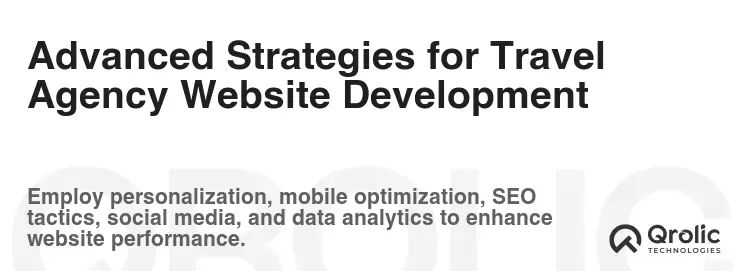
Beyond the foundational elements, consider these advanced strategies to elevate your website and gain a competitive edge.
1. Personalization: Tailoring the Experience
Personalize the user experience based on their browsing history, past bookings, and preferences.
-
Dynamic Content: Display dynamic content that is tailored to the user’s interests.
-
Personalized Recommendations: Offer personalized recommendations for destinations, activities, and packages.
-
Targeted Marketing Campaigns: Run targeted marketing campaigns that are based on user data.
2. Chatbots: Automating Customer Service
Implement chatbots to automate customer service tasks, such as answering FAQs and providing booking assistance.
-
24/7 Availability: Chatbots can provide 24/7 support to users.
-
Instant Responses: Chatbots can provide instant responses to common questions.
-
Reduced Customer Service Costs: Chatbots can help reduce customer service costs.
3. Virtual Reality (VR) and Augmented Reality (AR): Immersive Experiences
Consider incorporating VR and AR technology to provide immersive travel experiences.
-
Virtual Tours: Offer virtual tours of destinations and accommodations.
-
AR Overlays: Use AR overlays to provide additional information about landmarks and attractions.
-
Enhanced Engagement: VR and AR can enhance user engagement and provide a more memorable experience.
4. Artificial Intelligence (AI): Smarter Recommendations and Automation
Leverage AI to provide smarter recommendations and automate tasks.
-
AI-Powered Search: Use AI to improve search functionality and provide more relevant results.
-
AI-Driven Personalization: Use AI to personalize the user experience.
-
Automated Content Generation: Use AI to automate content generation.
5. Multilingual Support: Reaching a Global Audience
If you target international travelers, offer multilingual support.
-
Website Translation: Translate your website into multiple languages.
-
Multilingual Customer Support: Provide customer support in multiple languages.
-
Targeted Marketing Campaigns: Run targeted marketing campaigns in different languages.
6. Loyalty Programs: Rewarding Customer Loyalty
Implement a loyalty program to reward customer loyalty and encourage repeat business.
-
Points System: Offer points for every booking.
-
Exclusive Discounts: Provide exclusive discounts to loyalty program members.
-
Tiered Membership Levels: Create tiered membership levels with increasing benefits.
7. Dynamic Pricing: Optimizing Revenue
Use dynamic pricing to optimize revenue based on demand and availability.
-
Real-Time Pricing Updates: Update prices in real-time based on demand and availability.
-
Personalized Pricing: Offer personalized pricing based on user data.
-
Competitive Pricing: Monitor competitor pricing to ensure that your prices are competitive.
Steps to Develop a Successful Travel Agency Website
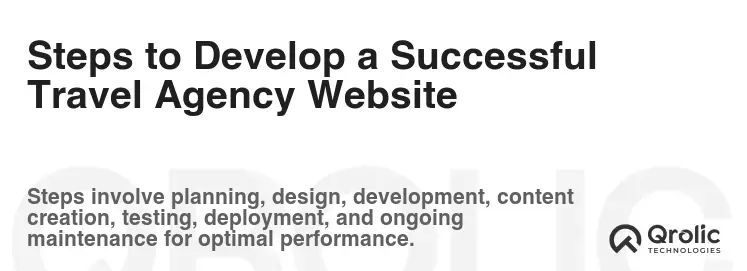
Developing a successful travel agency website development requires a structured approach. Here’s a step-by-step guide:
Step 1: Define Your Goals and Target Audience
- What do you want to achieve with your website? (e.g., increase bookings, generate leads, build brand awareness)
- Who is your target audience? (e.g., budget travelers, luxury travelers, families)
- What are their needs and preferences?
Step 2: Conduct Keyword Research
- Identify the keywords that your target audience is using to search for travel-related information.
- Use keyword research tools like Google Keyword Planner, Ahrefs, and SEMrush.
Step 3: Choose a Domain Name and Hosting Provider
- Choose a domain name that is relevant to your business and easy to remember.
- Select a reliable hosting provider that offers good performance and security.
Step 4: Select a Website Platform or CMS
- Choose a website platform or CMS (Content Management System) that meets your needs.
- Popular options include WordPress, Joomla, and Drupal.
- Consider using a travel-specific CMS for specialized functionality.
Step 5: Design Your Website
- Create a visually appealing and user-friendly website design.
- Consider hiring a professional web designer or using a pre-designed template.
Step 6: Develop Your Website Content
- Create high-quality, informative, and engaging content.
- Optimize your content with relevant keywords.
Step 7: Implement Booking Functionality (if applicable)
- Integrate a user-friendly booking engine.
- Ensure secure payment processing.
Step 8: Optimize for Mobile
- Ensure that your website is responsive and mobile-friendly.
Step 9: Implement SEO Best Practices
- Optimize your website for search engines.
- Build high-quality backlinks.
Step 10: Test Your Website
- Thoroughly test your website to ensure that it is working properly.
- Test on different browsers and devices.
Step 11: Launch Your Website
- Launch your website and promote it to your target audience.
Step 12: Track Your Results and Make Improvements
- Track your website’s performance using analytics tools.
- Make improvements based on your findings.
Ready to Build Your Next Project?
Let’s turn your ideas into a powerful digital solution. Contact us today to get started with expert web development and design services.
Benefits of Working with a Professional Web Development Agency

While DIY website building is possible, partnering with a professional web development agency can offer significant advantages, especially for travel agencies with specific needs and complex requirements.
-
Expertise and Experience: Web development agencies possess the expertise and experience to create high-quality, functional, and visually appealing websites.
-
Custom Solutions: They can develop custom solutions that are tailored to your specific needs and goals.
-
Time Savings: They can save you time and effort by handling all aspects of website development.
-
Ongoing Support: They can provide ongoing support and maintenance to ensure that your website remains up-to-date and secure.
-
Improved ROI: A professionally developed website can generate a higher return on investment (ROI) by attracting more customers and increasing bookings.
Qrolic Technologies: Your Partner in Travel Agency Website Development
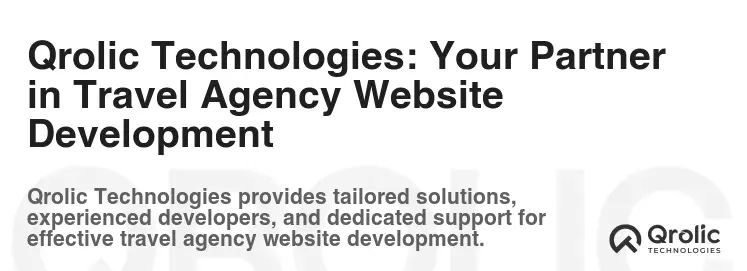
At Qrolic Technologies (https://qrolic.com/), we understand the unique challenges and opportunities facing travel agencies in the digital age. We offer comprehensive website development services tailored to the travel industry, including:
- Custom Website Design: We create visually stunning and user-friendly websites that reflect your brand and attract customers.
- Booking Engine Integration: We seamlessly integrate booking engines to streamline the reservation process.
- SEO Optimization: We optimize your website for search engines to drive organic traffic.
- Mobile Optimization: We ensure that your website is fully responsive and mobile-friendly.
- Content Creation: We create high-quality content that informs and engages your audience.
- Ongoing Support and Maintenance: We provide ongoing support and maintenance to keep your website running smoothly.
We are committed to helping travel agencies succeed online. Contact us today to learn more about our services and how we can help you build a powerful website that drives bookings and grows your business. Our expertise in travel website design and tour operator web design makes us the ideal partner for your digital journey.
Conclusion: Investing in Your Online Future
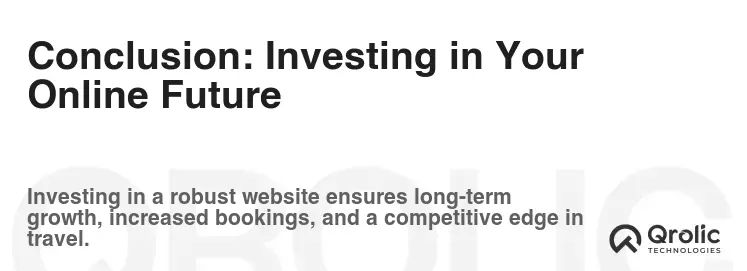
In conclusion, a well-developed website is an indispensable asset for travel agencies in today’s digital landscape. By focusing on user-friendliness, compelling visuals, informative content, seamless booking functionality, mobile optimization, and SEO, you can create a website that attracts customers, drives bookings, and establishes your agency as a leader in the travel industry. Remember to embrace advanced strategies like personalization, chatbots, and VR/AR to enhance the user experience and stay ahead of the competition. Whether you choose to build your website in-house or partner with a professional web development agency like Qrolic Technologies, investing in your online presence is an investment in the future of your travel agency.

